The Federal Criminal Courts
Posted by David C. Hardy on August 31, 2018
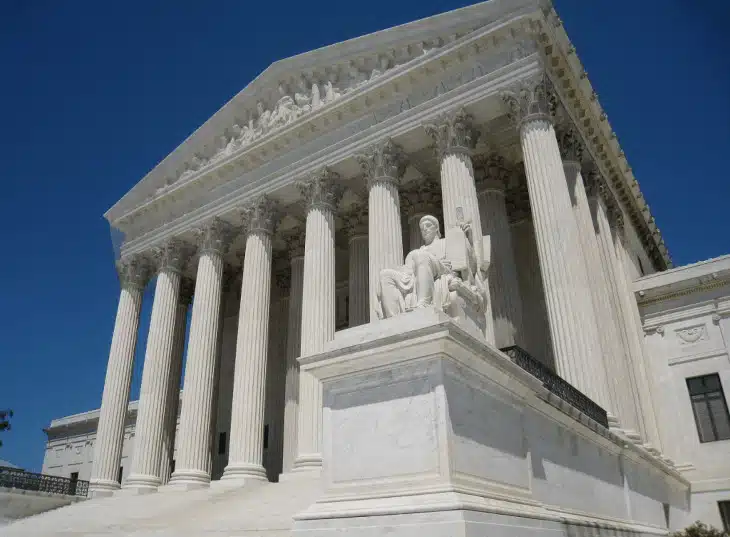
In 2005, in the case of United States v. Booker, the United States Supreme Court made the federal sentencing guidelines advisory rather than mandatory.
Why Do Federal Courts Exist?
The federal courts exist in order to decide disputes concerning the United States Constitution, as well as to handle cases that involve laws passed by the United States Congress, which are called federal statutes.
What is Federalism?
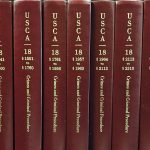
Federal criminal laws, also known as federal criminal statutes, are organized in the United States Code Annotated.
Federalism is a system in which governmental power is shared by both the federal government and the state governments.
When they wrote the U.S. Constitution, the framers of the Constitution gave a limited number of governmental powers to the federal government and reserved the vast majority of governmental powers to the state governments.
However, since the U.S. Constitution was ratified in 1788, sometimes out of necessity and sometimes based on Congress’s desire for more power, the federal government’s powers have expanded.
How Does Federalism Affect Federal Criminal Law?
In order for the U.S. Congress to write a federal criminal law, the U.S. Constitution must authorize Congress power over that subject matter.
For example, it’s clear that the U.S. Congress can pass criminal laws punishing counterfeiting or piracy on the high seas because the U.S. Constitution explicitly gives Congress the power to do so.
However, Congress passes laws about things that the U.S. Constitution does not explicitly mention. For example, Congress has passed laws that punish persons for distributing illegal drugs, but drugs are not mentioned in the U.S. Constitution.

Federal law prohibits the unlawful distribution of cocaine.
The federal courts have justified federal criminal laws punishing the distribution of illegal drugs based on a clause in the Constitution that gives the Congress power to regulate commerce with foreign nations and among the States. “Commerce” can be defined as the activity of buying and selling goods. Because cocaine is produced outside of the United States, Congress claims the right to punish its distribution based on this commerce clause.
Sometimes, however, federal criminal laws appear to stretch the meaning of the U.S. Constitution beyond reason. For example, there is a federal law that makes it a crime for a person that has been convicted of a felony to possess a firearm or bullet. Because there is no explicit power in the Constitution giving the Congress the power to prohibit persons convicted of a felony from possessing a firearm, the Congress has relied on the commerce clause as a basis for the law. Therefore, in order to prove a person is guilty of felon in a possession of a firearm in federal courts, the federal prosecutor must prove that the firearm, or the bullet, traveled from one state to another, or from another country to the United States.
In theory then, if the gun and bullets were all made in the State in which the Defendant possessed the firearm, the Federal Government would not have jurisdiction over the case and only the State Government could prosecute the Defendant.
What Are The Different Types Of Federal Courts
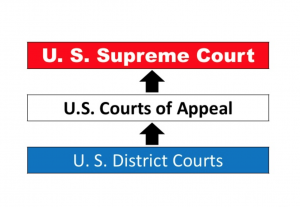
The federal courts have three levels: the District Courts, the Circuit Courts, and the Supreme Court of the United States.
What Are the Federal District Courts?
The Federal District Courts are the courts in which federal trials take place. There are 94 federal district courts in the United States. One of those federal district courts is located in Tampa, Florida.
Federal district Court Judges are appointed by the President and confirmed by the U.S. Senate for a life term.
Federal Magistrate Judges handle some of the work in the Federal District Courts. Federal Magistrate Judges are not appointed by the president and confirmed by the Senate. Rather, the District Court Judges appoint the Magistrate Judges to help them handle their caseload.
In criminal cases, Magistrate Judges can handle federal misdemeanor criminal cases, issue search warrants and arrest warrants, conduct initial hearings, set bail, conduct a change of plea hearings, and hear motions to suppress evidence.
What Are The Federal Circuit Courts?
In the federal court system, the Federal Circuit Courts are the first level of appeal. In an appeal, a defense attorney may complain to the Appellate Judges that a Federal District Court Judge made a mistake during a trial or at sentencing that prejudiced a Defendant.
A panel of three Circuit Court judges decides appeals to the circuit courts. Attorneys on both sides of a case will file briefs with the judges, arguing why the trial court’s decision should be affirmed or reversed.
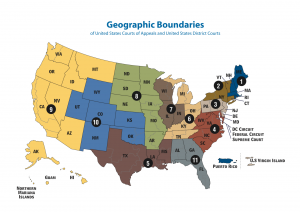
There are 13 Federal Circuit Courts in the United States.
There are 13 Federal Circuit Courts in the United States.
Twelve of the Federal Circuits divide the country into different regions. The Eleventh Circuit, for example, includes the states of Florida, Georgia, and Alabama. Cases from the District Courts of those states are appealed to the United States Court of Appeals for the Eleventh Circuit, which is headquartered in Atlanta, Georgia. Additionally, there is a 13th federal circuit court called the Federal Circuit Court of Appeals. That court has nationwide jurisdiction over certain types of cases, such as patent cases.
What is the United States Supreme Court?
The United States Supreme Court is the final level of appeal in the federal system. It is based in Washington, D.C.
The Justices on the Supreme Court are appointed by the President and confirmed by the Senate.
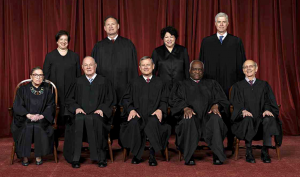
The Justices of the United States Supreme Court in 2018.
In the Federalist Papers, which were a series of newspaper articles designed to argue for the various States to ratify, or adopt, the United States Constitution, Alexander Hamilton called the United States Supreme Court “The Least Dangerous Branch”, perhaps because at the time, the Supreme Court was seen as the least powerful of the 3 proposed branches of Government.
However, the United States Supreme Court has developed into an extremely powerful and co-equal branch of Government. The Supreme Court has the power to declare both presidential and congressional actions unconstitutional and therefore void.
The number of justices on the U.S. Supreme Court is set by Congress and has varied over time. In 1789 there were six Justices; in 1863 there were 10 Justices; in 1869 the number of Justices was set at nine, where it stands today.
The Supreme Court is the most important court in the United States because it has the final say on legal questions.
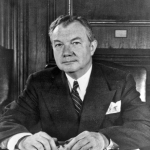
Associate Justice of the United States Supreme Court Robert Jackson.
As Associate Justice of the United States Supreme Court Robert Jackson once said, “We [the Supreme Court] are not final because we are infallible, but we are infallible only because we are final.
If You Or A Loved One Has Been Charged With A Federal Crime in Tampa, Florida, Contact The Hardy Law Firm, P.A.
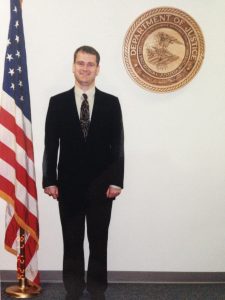
Tampa federal attorney David C. Hardy began his work in the federal courts when he served as an intern with the United States Department of Justice in 1999.
If you or a loved one has been accused of a federal crime in Tampa, Florida, contact federal criminal defense attorney David C. Hardy. Attorney Hardy is board certified as an expert in criminal trial law. He began his work in the federal courts when he served as an intern with the United States Department of Justice in 1999.
In the federal courts, Attorney Hardy has handled a wide variety of cases including international extradition, drug trafficking, bank fraud and healthcare fraud, immigration offenses, identity theft, the misbranding of drugs, and firearms offenses. Attorney Hardy has represented clients in federal trial and appellate courts in Florida, Texas, and Georgia. Contact The Hardy Law Firm today!
Posted in Federal Criminal Defense

David C. Hardy
David C. Hardy is a criminal defense attorney with offices in Tampa, Florida. He is a former prosecutor that is Board Certified by the Florida Bar and The National Board of Trial advocacy as an expert in criminal trial law. He practices in the areas of federal criminal defense, Florida criminal defense, and Florida DUI defense.
